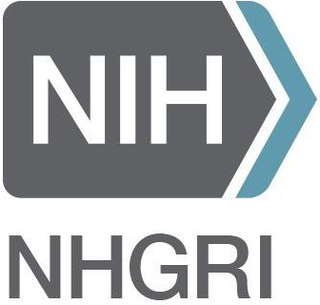
The National Human Genome Research Institute (NHGRI) is an institute of the National Institutes of Health, located in Bethesda, Maryland.
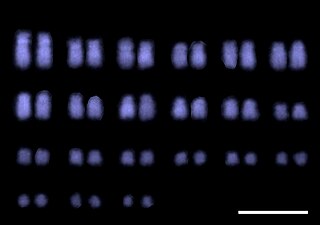
Molecular cytogenetics combines two disciplines, molecular biology and cytogenetics, and involves the analysis of chromosome structure to help distinguish normal and cancer-causing cells. Human cytogenetics began in 1956 when it was discovered that normal human cells contain 46 chromosomes. However, the first microscopic observations of chromosomes were reported by Arnold, Flemming, and Hansemann in the late 1800s. Their work was ignored for decades until the actual chromosome number in humans was discovered as 46. In 1879, Arnold examined sarcoma and carcinoma cells having very large nuclei. Today, the study of molecular cytogenetics can be useful in diagnosing and treating various malignancies such as hematological malignancies, brain tumors, and other precursors of cancer. The field is overall focused on studying the evolution of chromosomes, more specifically the number, structure, function, and origin of chromosome abnormalities. It includes a series of techniques referred to as fluorescence in situ hybridization, or FISH, in which DNA probes are labeled with different colored fluorescent tags to visualize one or more specific regions of the genome. Introduced in the 1980s, FISH uses probes with complementary base sequences to locate the presence or absence of the specific DNA regions you are looking for. FISH can either be performed as a direct approach to metaphase chromosomes or interphase nuclei. Alternatively, an indirect approach can be taken in which the entire genome can be assessed for copy number changes using virtual karyotyping. Virtual karyotypes are generated from arrays made of thousands to millions of probes, and computational tools are used to recreate the genome in silico.
The Talking Glossary of Genetic Terms is an audio/visual glossary of 256 terms prepared and hosted by the National Human Genome Research Institute in the United States.
The National Human Genome Research Institute(NHGRI) created the Talking Glossary of Genetic Terms to help people without scientific backgrounds understand the terms and concepts used in genetic research. Simply click on the term of interest to open a page with a wealth of information, including the term's pronunciation, audio information, images and additional links to related terms. Students, teachers and parents will find the glossary an easy-to-use, always available learning source on genetics.

Francis Sellers Collins is an American physician-geneticist who discovered the genes associated with a number of diseases and led the Human Genome Project. He is the former director of the National Institutes of Health (NIH) in Bethesda, Maryland, from 17 August 2009 to 19 December 2021, serving under three presidents, and for over thirteen years.

Eric D. Green is an American genomics researcher who had significant, start-to-finish involvement in the Human Genome Project. He is the director of the National Human Genome Research Institute (NHGRI) at the National Institutes of Health (NIH), a position he has held since 2009. Green is an ardent St. Louis Cardinals fan.

McDonnell Genome Institute at Washington University in St. Louis, Missouri, is one of three NIH funded large-scale sequencing centers in the United States. Affiliated with Washington University School of Medicine and the Alvin J. Siteman Cancer Center, the McDonnell Genome Institute is creating, testing and implementing new approaches to the study of genomics with the goal of understanding human health and disease, as well as evolution and the biology of other organisms.

Elaine Ann Ostrander is an American geneticist at the National Human Genome Research Institute (NHGRI) of the National Institutes of Health (NIH) in Bethesda, Maryland. She holds a number of professional academic appointments, currently serving as Distinguished and Senior Investigator and head of the NHGRI Section of Comparative Genomics; and Chief of the Cancer Genetics and Comparative Genomics Branch. She is known for her research on prostate cancer susceptibility in humans and for conducting genetic investigations with the Canis familiaris —the domestic dog— model, which she has used to study disease susceptibility and frequency and other aspects of natural variation across mammals. In 2007, her laboratory showed that much of the variation in body size of domestic dogs is due to sequence changes in a single gene encoding a growth-promoting protein.
Jeffrey M. Trent is the founding president and director of the Translational Genomics Research Institute. He has been Vice President and Research Director of the Van Andel Institute since 2009. He was the founding director of NIH's National Human Genome Research Institute in 1993.
The GWAS catalog is a free online database that compiles data of genome-wide association studies (GWAS), summarizing unstructured data from different literature sources into accessible high quality data. It was created by the National Human Genome Research Institute (NHGRI) in 2008 and have become a collaborative project between the NHGRI and the European Bioinformatics Institute (EBI) since 2010. As of September 2018, it has included 71,673 SNP–trait associations in 3,567 publications.

Joan Ellen Bailey-Wilson is an American statistical geneticist. She is a senior investigator and co-chief of the Computational and Statistical Genomic Branch of the National Human Genome Research Institute.
Medical genetic ethics is a field in which the ethics of medical genetics is evaluated. Like the other field of medicine, medical genetics also face ethical issues.
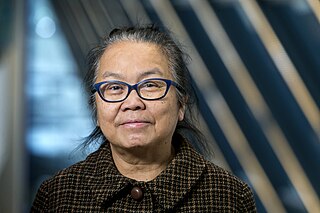
Kesara Margrét Anamthawat-Jónsson is professor of botany and plant genetics at the Faculty of Life and Environmental Sciences, School of Engineering and Natural Sciences, University of Iceland.

Natasha Jane Caplen is a British-American geneticist who discovered RNA interference (RNAi) in mammalian cells. She is a senior investigator and head of the functional genetics section at the National Cancer Institute.
Charmaine DM Royal is an American geneticist and Associate Professor at the Institute for Genome Sciences & Policy and the Department of African and African American Studies at Duke University. She studies the intersections of race, ethnicity, ancestry genetics, and health, especially as they pertain to historically marginalized and underrepresented groups in genetic and genomic research; and genomics and global health. Her major interest is in addressing root causes and implementing sustainable solutions regarding problems of race and racism in research, healthcare, and society. Royal is a Human Heredity and Health in Africa (H3Africa) Independent Expert Committee (IEC) member appointed by the National Institutes of Health (NIH) and is a 2020 Ida Cordelia Beam Distinguished Visiting Professor at the University of Iowa.
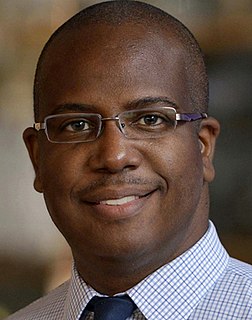
Neil Hanchard is a Jamaican physician and scientist who is clinical investigator in the National Human Genome Research Institute (NHGRI), where he leads the Childhood Complex Disease Genomics section. Prior to joining NHGRI, he was an associate professor of molecular and human genetics at the Baylor College of Medicine. He is a fellow of the American College of Medical Genetics and Genomics,. Hanchard's research focuses on the genetics of childhood disease, with an emphasis on diseases impacting global health.
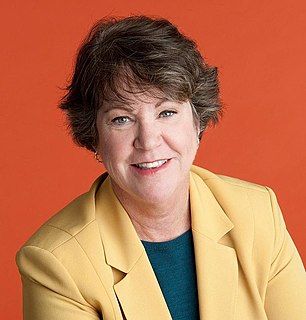
Kathy Lynn Hudson is an American microbiologist specializing in science policy. She was the deputy director for science, outreach, and policy at the National Institutes of Health from October 2010 to January 2017. Hudson assisted in the creation and launch of All of Us, the BRAIN initiative, and the National Center for Advancing Translational Sciences. She founded the Genetics and Public Policy Center at Johns Hopkins University in 2002. Hudson is an advocate for women in science.

Tara Matise is an American geneticist at Rutgers University. Since 2018, she has served as chair of the Department of Genetics. Her research interests span computational genetics, data science, and human genetics. She is co-director of the Rutgers University Genetics Coordinating Center.

Katrina A. Blouke Goddard is an American genetic epidemiologist and biostatistician specializing in public health genomics and the translation of genomic applications into clinical practice. Goddard is the director of the division of cancer control and population sciences (DCCPS) at the National Cancer Institute (NCI). She was previously the distinguished investigator and director of translational and applied genomics at the Kaiser Permanente Center for Health Research and a faculty member at Case Western Reserve University.
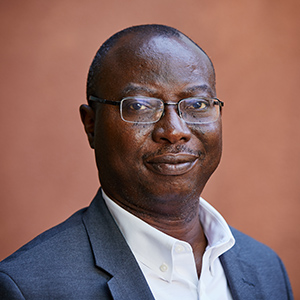
Adebowale A. Adeyemo is a Nigerian physician-scientist and genetic epidemiologist specialized in genomics and cardiometabolic disorders. He is the deputy director and chief scientific officer of the Center for Research on Genomics and Global Health at the National Human Genome Research Institute.













